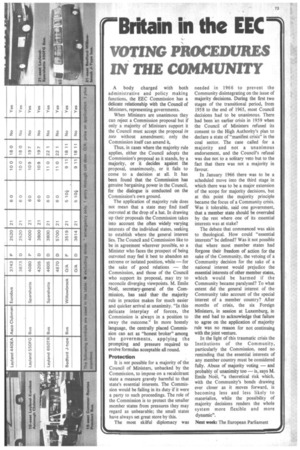rBritain in the EEC'
Page 75

If you've noticed an error in this article please click here to report it so we can fix it.
VOTING PROCED S IN THE COMMUNITY
A body charged with both administrative and policy making functions, the EEC Commission has a delicate relationship with the Council of Ministers, representing governments.
When Ministers are unanimous they can reject a Commission proposal but if only a majority of Ministers support it the Council must accept the proposal in toto without amendment; only the Commission itself can amend it.
Thus, in cases where the majority rule applies, either the Council adopts the Commission's proposal as it stands, by a majority, or it decides against the proposal, unanimously, or it fails to come to a decision at all. It has been found that the Commission has genuine bargaining power in the Council, for the dialogue is conducted on the Commission's own ground.
The application of majority rule does not mean that a state may find itself outvoted at the drop of a hat. In drawing up their proposals the Commission takes into account the often widely varying interests of the individual states, seeking to establish where the general interest lies. The Council and Commission like to be in agreement wherever possible, so a Minister who faces the prospect of being outvoted may feel it best to abandon an extreme or isolated position, while — for the sake of good relations — the Commission, and those of the Council who support its proposal, may try to reconcile diverging viewpoints. M. Emile Noel, secretary-general of the Commission, has said that the majority rule in practice makes for much easier and quicker arrival at unanimity. "In this delicate interplay of forces, the Commission is always in a position to sway the outcome." In more homely language, the centrally placed Commission can act as "honest broker" among the governments, applying the prompting and pressure required to evolve formulas acceptable all round.
Protection It is not possible for a majority of the Council of Ministers, unbacked by the Commission, to impose on a recalcitrant state a measure gravely harmful to that state's essential interests. The Commission would be failing in its duty if it were a party to such proceedings. The role of the Commission is to protect the smaller member states from pressures they may regard as unbearable; the small states have always set great store by this.
The most skilful diplomacy was needed in 1966 to prevent the Community disintegrating on the issue of majority decisions. During the first two stages of the transitional period, from 1958 to the end of 1965, most Council decisions had to be unanimous. There had been 'an earlier crisis in 1959 when the Council of Ministers refused its consent to the High Authority's plan to declare a state of "manifest crisis" in the coal sector. The case called for a majority and not a unanimous endorsement, and the Council's refusal was due not to a solitary veto but to the fact that there was not a majority in favour.
In January 1966 there was to be a scheduled move into the third stage in which there was to be a major extension of the scope for majority decisions, but at this point the majority principle became the focus of a Community crisis. Was it tolerable, said one government, that a member state should be overruled by the rest where one of its essential interests was at stake?
The debate that commenced was akin to theological. How could "essential interests" be defined? Was it not possible that where most member states had forgone their freedom of action for the sake of the Community, the vetoing of a Community decision for the sake of a national interest would prejudice the essential interests of other member states, which would be harmed if the Community became paralysed? To what extent did the general interest of the Community take account of the special interest of a member country? After months of crisis, the six Foreign Ministers, in session at Luxemburg, in the end had to acknowledge that failure to agree on the application of majority rule was no reason for not continuing with the joint venture.
In the light of this traumatic crisis the Institutions of the Community, particularly the Commission, need no reminding that the essential interests of any member country must be considered fully. Abuse of majority voting — and probably of unanimity too — is, says M. Emile Noel, "a theoretical risk which, with the Community's bonds drawing ever closer as it moves forward, is becoming less and less likely to materialize, while the possibility of majority decisions renders the whole system more flexible and more dynamic".
Next week: The European Parliament




















































































































































